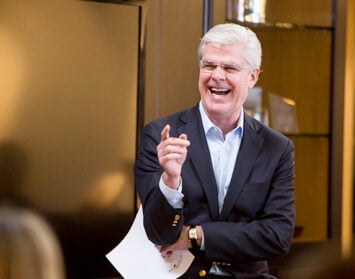By Jason Hughes
How can we identify what is wasteful of our time and resources? This seems to be the pertinent question that is top of mind for every business leader, especially today, as efficiency and costs are under the microscope. As a company leader who also happens to work within commercial real estate, I have conversations surrounding this question with other executives and my own team on an almost daily basis. This is an incredible opportunity for companies to reduce the amount of wasteful spending, reconsider their top priorities and reimagine their businesses in ways we haven’t been able to for a while. While scrutinizing your budget takes a concerted effort and may ruffle a few feathers along the way, the positive impacts on your bottom line and the future success of your organization are well worth it.
But where do you start? Fortunately, I have a straightforward answer—that doesn’t involve layoffs. With commercial real estate lease costs as one of a business’s top three fixed costs for companies that occupy space, real estate is the perfect place to begin.
Here are some simple ways that companies can audit their own real estate expenses to save money to invest back in other aspects of their businesses.
The Easy Targets—Unnecessary Expenditures
First, I’ll start with a real-time example at Hughes Marino. After a self-audit of our expenses, at one of our locations we realized we were paying for parking spaces that no one was even using. We were able to effortlessly eliminate $2,500 per month, equating to $30,000 per year in parking alone, and quickly. While that cost might not break the bank, why pay for a service or amenity you aren’t even using? A simple review of your lease with the help of a tenant advisor could quickly save you money that doesn’t affect your company—aside from positively increasing your bottom line. If my parking example doesn’t apply to you, ask yourself “What is my version of a random charge that I’m not aware of?” It might not be real estate-related, but I can guarantee you’ll find at least a handful of charges you’ve been paying over the years for services that aren’t even utilized anymore. Another charge we recently uncovered was for cable TV services for a TV in an office that hasn’t once been turned on in over four years. Maybe your company has unnecessary duplicative licenses for software, or multiple accounts from the same provider. Implementing zero-based budgeting can also quickly identify charges you may have been paying for years that just don’t make sense anymore. Without a thorough audit, you’ll never know the money that’s being wasted needlessly.
Be Aware of Operating Expense Errors
If you’re leasing space for your business, you’re most likely aware of the “operating expenses” or “CAMs” (Common Area Maintenance) that are included in your lease, such as utilities, insurance, property taxes, maintenance, landscaping, etc. And odds are, when you receive the bill from your landlord, you probably pay it without batting an eye. But if you knew the amount of errors our team has caught that were charged to our clients by landlords (most likely on accident), you would probably give your bill a second, or even a third look. It’s not to say all landlords overcharge, but there is always room for error, and unless you know what to look for, you run the risk of being overcharged for months, or even years. In one case, we found millions of dollars in overcharges for a client, and other clients tens of thousands or more. While your team may be able to find some obvious overcharges, we always recommend consulting a professional lease audit team (we have such a team), that knows the ins and outs of what to look for that might not be common knowledge to others not in the industry.
Paying for Unneeded Space
Maybe your headcount or company situation has changed, despite having years left on your lease, and you feel stuck. Whether your lease is expiring in the next 12 months, or 4+ years from now, you always have options, especially if you have the right real estate team in place to ensure you’re not leaving money on the table or missing an opportunity for a strategic shift. Depending on your current lease expiration and needs, there are steps you can take to reduce costs or prepare for a move, expansion or space reduction. Luckily, this is an area we specialize in, and our team is constantly developing new real estate strategies that fit the needs of our clients.
Opt for Energy Efficient Practices
While this might not make a huge dent in your budget initially, opting for ways to be more sustainable will pay off in the long run. Conduct an energy audit. This might seem obvious, but transitioning to a paperless system will reduce the amount of space you need to operate your business, where you can cut down on real estate expenses. Law firms, for instance, are opting for digital libraries and filing systems. This can open up space for new conference rooms and offices, or even downsize a real estate footprint to save on unnecessary costs (as mentioned previously). Energy-efficient appliances and asking your team to shut down their computers at night can reduce your energy bills. On a micro scale, by installing energy efficient light bulbs that might be more expensive upfront, you actually save on electricity in the long run, as they use around 75% less energy, and last about 10 times longer than traditional incandescent bulbs.
In an age where efficiency is top of mind, every company should take some time to scrutinize their spending. Embracing these changes can spark creativity in resource management, turning a routine audit into a rewarding challenge. Here’s to smarter spending and a stronger bottom line!
Jason Hughes founded Hughes Marino in 2011, an award-winning global real estate advisory firm that specializes in representing tenants and buyers. A pioneer in the field of tenant representation, Jason has specialized in representing tenants and buyers for more than 30 years. Contact Jason at 1-844-662-6635 or jason@hughesmarino.com to learn more about Hughes Marino.









